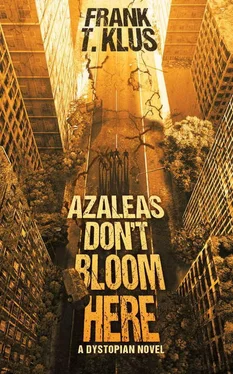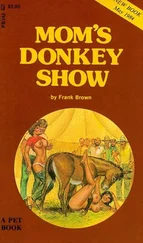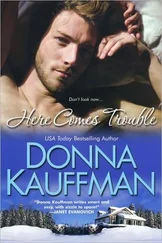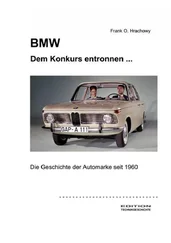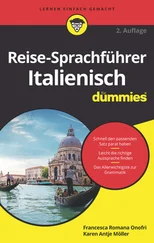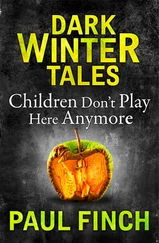Crime was everywhere. Without jobs, young people would join gangs and rob the cartwheelers of their property. There weren’t many of the old police anymore. They were replaced by roving groups of paramilitary organizations. The Lightning Squad patrolled this side of the city, but they charged the cartwheelers for the privilege of providing security. If they couldn’t afford to pay them, they had to provide for their own security. Many couldn’t; many wouldn’t.
Is the dead district a sign of the decline and fall of the American Empire? Did some invading horde from the dark realm conquer and impose misery upon them? It wasn’t supposed to be this way. These denizens were the freest of people, the most powerful, and the most entrepreneurial. They couldn’t lose. They were the magnet for opportunists, industrialists, consumers, and immigrants. They were the best of the best, those who could not lose, and had the will to win, to conquer, and to destroy anyone who would threaten their great nation.
Minds were made up and truth emerged. This would be the age of entrepreneurship. Lose the notion of finding a job, and create one instead. Unemployment was the fate of the lazy; certainly not the responsibility of government. Unemployment rates? No one knew. No one counted anymore.
Business regulations were an impediment to success. Get rid of them! That was the clarion call. Taxes choked off success. Get rid of taxes on the successful; let the lazy and indigent pay them.
Government handouts only encourage indolence. Get rid of them! If there are no government handouts, one has to create a job. If one couldn’t do that, too bad. Save the money to help out the thrivers. Help them boost their trade, replenish their inventory, and procure more markets. This is what success looks like—reward the winners and punish the losers.
Schools should be built for children from successful parents. It’s wasted on society’s failures. Years of high dropout rates, failing pupils and poor test scores became proof that the public school system was broken and needed to be shut down. Create schools for the successful, and one can guarantee success.
So what went wrong?
Nothing went wrong, one would hear. They have NOGOV. With one hand on the pulse of the economy and another on the government, they would keep things right. Consisting of a group of the most powerful men in America, they knew the truth. That truth would be relayed to the political pundits, reporters, and educators. Things would be set right. Radio, television, newspapers, and the internet would be the shining beacon relaying the absolute truth to the thriving masses.
So what of the “tombstones” one may ask?
They were abandoned to escape the plague of illiteracy, sloth, and weak minds. Businesses moved where there were better opportunities. The truth is, according to those who know, is that the dead districts were created by the diseased; the people that can’t; the people that won’t. Those that will not, never will. Those who fail now, will always fail. The tombstones are a monument to the slothful, the lazy, and the apathetic; certainly not any failure of the truth everyone was so certain of.
So where do the successful people live now?
Most went to the suburbs, but the real goal was getting to the Fortress—now that represented opportunity. Looking like a medieval city from the outside, the brick walls, thirty-seven feet high, rise with sublime splendor above the rotting city. They were designed to keep the hordes of the hungry out while creating rich and lovely communities for the thriving affluent. They had the sandy white shores of Lake Michigan at the east end, a giant mall in the middle, and mansions decorated the lush lawns.
Walled off from the detritus, these bastions of economic boom still held the promise of prosperity, and would be gawked at and glorified by the grungy dwellers nearby. They’d see some big, shiny black car driving in and out of the ornate gates and yell, hoot, whistle, and laugh at this strange instrument of wealth and power. The relationship these people on one side of the wall had with those of the other side was like a Dickensian tale of the haves and have-nothings; the wealthy and the wretched.

Everson Consulting occupied the top stories of the Solariano Building that stood guard over the Fortress in what was left of the business district in the city. Standing before the massive window of the conference room, Eugene Sulke stood in his starched saffron shirt and amethyst tie and stared twenty-one stories below, wearing a serious expression.
Standing next to him was his boss, Stuart Everson. Eugene made a point of going to the same hair stylist as his superior, mentor, and hero. He wore his hair the same way—slightly longish and wavy, but still in his mid-forties, he had his golden-dyed locks instead of Stu’s silver hair. Both had pot bellies, a sign of affluence in these times, and wore finely tailored clothes to mark their success.
Stu playfully poked Eugene in the ribs. With a sly smirk and a sideways glance, Stu leaned over and said, “Thank heavens for the Fortress. Honestly, I don’t know how those other people can live that way. Look at them, Gene: dirty, naked, illiterate. Thank God I have the Fortress.”
“Sure is something, Stu.”
Stu smiled. “Why don’t you and Catherine come over for Labor Day—one final barbecue for the summer?”
“Sure, Stu. We’d love to.”
Eugene had been inside the Fortress many times, and dreamed of being vice president with a home inside it one day, but a sudden chill overtook him as he turned his head to the dirty and naked people outside. Could we be responsible?
Eugene raced to his car through the empty parking lot. His valise was bouncing off his right leg, and his oversized belly flapped against him. Sweat stained his shirt and poured off his forehead. His face was flushed and his heart pounded against his chest. It was late; very late as he reached the car door. With tires squealing, he headed for the open road.
A quarter past seven. Oh why did they keep me so long? They must have known it was getting late. South side of Old Chicago and it’s fifteen minutes before sunset. Fifteen minutes! How long to the Tri-State? Yeah, I could do it. I just need a break with the lights.
As Eugene reached the first traffic light, it turned red. Great ! Come on, come on. Give me a few breaks. Come on green, come on . The light turned green; the tires screeched.
Eugene glanced at the speedometer; fifty, maybe fifty-five . Forty mile speed zone. Don’t let the Lightning Squad see me. They’ll ticket me for speeding, and then jail me for violating curfew. Oh why did they keep me so long? Come on green. Why did they keep me so long, answering senseless questions; questions I already answered? Just let me make it home.
It was now twenty-five past seven, and probably several more minutes from the Tri-State Tollway. There was no other traffic and Eugene began to relax.
Just then he heard the whistles of the Lightning Squad. His pulse rose again. Did the sun set yet? What’s my speed? Damn! One motorcycle passed him and moved just ahead of him, another moved alongside him and motioned for him to pull over, while the third parked right behind him. There was nowhere to go. He had been triangulated; the classic position of the Lightning Squad.
Eugene waited. The cyclists were heavily armed with semi-automatic weapons strung around their shoulders. The middle cycle now pulled alongside Eugene, and its driver dismounted. He took off his helmet, grinning. Eugene’s frown began to melt. Dennis O’Reilly . Oh my God.
Читать дальше
